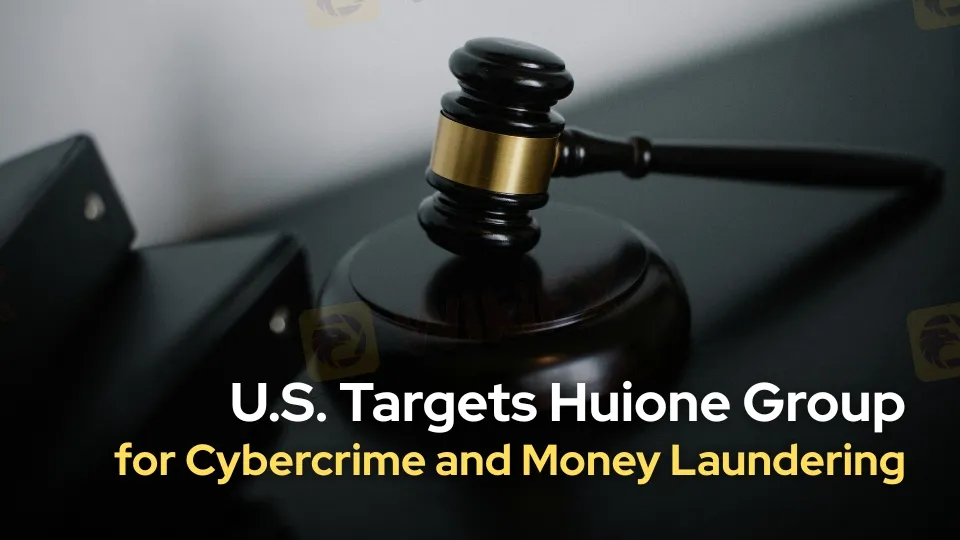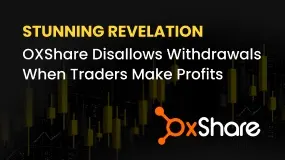简体中文
繁體中文
English
Pусский
日本語
ภาษาไทย
Tiếng Việt
Bahasa Indonesia
Español
हिन्दी
Filippiiniläinen
Français
Deutsch
Português
Türkçe
한국어
العربية
U.S. Treasury Targets Cambodia’s Huione Group for Cybercrime Money Laundering
Abstract:U.S. Treasury targets Huione Group for laundering $4B in cybercrime funds, including North Korea’s Lazarus Group scams, to disrupt global illicit finance networks.

The U.S. Treasury Department has taken significant action against Cambodia-based Huione Group, accusing it of facilitating billions of dollars in illicit financial transactions tied to cybercrime and online scams. A recent move by the Treasury's Financial Crimes Enforcement Network (FinCEN) seeks to block Huione from the American financial system, citing its role in laundering funds for global criminal syndicates, including North Koreas Lazarus Group.
The Treasury plans to call Huione a “major money laundering problem.” This would stop U.S. banks from working with the company. Reports say Huione handled over $4 billion in dirty money from August 2021 to January 2025. Of this, $37 million in digital currency came from North Korean cyberattacks, and $36 million was from “pig butchering” scams, where fraudsters trick people with fake love or investment offers.
Treasury Secretary Scott Bessent said Huione is a go-to place for bad actors, including North Korean groups and other criminals. This shows the rising worry about how digital money, cybercrime, and global fraud connect.
The Treasurys plan includes a 30-day period for public feedback before the rule is final. If approved, Huione would lose access to U.S. dollar services, which would hurt its ability to work with global banks. This could greatly limit its operations.

FinCEN‘s plan builds on Reuters reports that Huione Pay, a payment arm of the group, got over $150,000 in digital currency from a wallet tied to Lazarus hackers between June 2023 and February 2024. Huione Pay said it didn’t know the wallet was linked to Lazarus and claimed it didnt control it.
Digital currency is a key way for North Korea to dodge global sanctions, letting it buy restricted items. The United Nations has noted how North Korea uses these methods to fund its activities.
In January 2025, Huione launched its own digital coin, USDH, and a private chat service to rely less on apps like Telegram and Tether. Before this, Huione used Tether (USDT) for most of its deals. In July 2024, Tether froze a Huione Pay account after it was tied to money stolen by Lazarus. At least $14 million of that was from a $300 million hack of Japans DMM Bitcoin exchange in June 2024.
Huiones USDH coin is a way to avoid problems with outside services like Tether. This unregulated coin helps Huione hide its transactions and keep supporting illegal acts.
Elliptic, a top blockchain research firm, said Huione‘s marketplace offers illegal services like cleaning money, selling stolen personal information, and tools for big online scams. Its vendors reportedly work from Cambodia’s Golden Fortune Science and Technology Park, a place tied to forced labor and human trafficking, with victims from Vietnam, Malaysia, and China.
Elliptic also found that some Huione vendors sold electric shackles, likely used in human trafficking. Since starting in 2021, Huione has moved at least $11 billion through digital wallets, with most of it likely tied to illegal activities, according to Elliptic.
As the U.S. Treasury pushes its rules, the focus on Huione shows the tough fight against cybercrime, money laundering, and online scams in the global financial world. This case reminds us how digital currencies are still used by criminals to take advantage of weak spots in the system.

Disclaimer:
The views in this article only represent the author's personal views, and do not constitute investment advice on this platform. This platform does not guarantee the accuracy, completeness and timeliness of the information in the article, and will not be liable for any loss caused by the use of or reliance on the information in the article.
Read more

WikiFX Community Event Series, “Thailand Elites’ View”
WikiFX launched the “Thailand Elites’ View” event in its official community, featuring heavyweight guests from the Elites Club who shared their insights on the current state of Thailand’s forex market, compliance trends, and the building of investor confidence.

Scam Alert: Know the Risky Side of InstaForex in India
you should always Scam Alert in forex market. If something seems too good to be true, it often hides red flags behind it. Therefore, We reviewed InstaForex and reveal hidden risks associated with it. Whether you are an Indian trader, a potential user, or an existing client, it is crucial to understand the risks associated with InstaForex .

Going to Invest in FXCL? Move Back to Avoid Scams & Losses
Are FXCL officials calling you to make you a customer by promising a magical profit number? Stop! These officials follow this route to onboard customers and make them deposit at regular intervals. However, when you wish to withdraw, the officials will deny your request. This is nothing but a strong indicator of a scam forex broker. In this article, we will expose the wrongdoings of this Botswana-based broker.

Stunning Revelation: OXShare Disallows Withdrawals When Traders Make Profits
The revelation that OXShare disallows withdrawals to traders when they make profits is stunning but true. Many traders have complained about it on forex broker review platforms, but to no avail. They may receive assurances, but company officials do not live up to their promises. What’s more, these officials manipulate trades, forge vital details, and eventually scam traders who put their hard-earned capital on it. In this article, we will expose OxShare with proof. Read on to check them.
WikiFX Broker
Latest News
Join WikiFX’s Agent Growth Event | Turn Your Success into a Global Achievement
Forex Trends Explained for Your Successful Trading Experience
Do Kwon Faces 130-Year Prison Sentence After Guilty Plea in $40B Crypto Collapse
Best 5 Low-Spread FX Brokers in India 2025
Major Pairs in Forex: Top Traded Currency Insights
What is ECN in Trading? A Simple Guide
SEC Settles California Trader with Over $234,000 Spoofing Scheme
What Is Forex Trading Fee? A Beginner’s Guide
Understanding UAE’s Financial Market Regulation: SCA and DFSA
Scam Alert: Know the Risky Side of InstaForex in India
Currency Calculator


